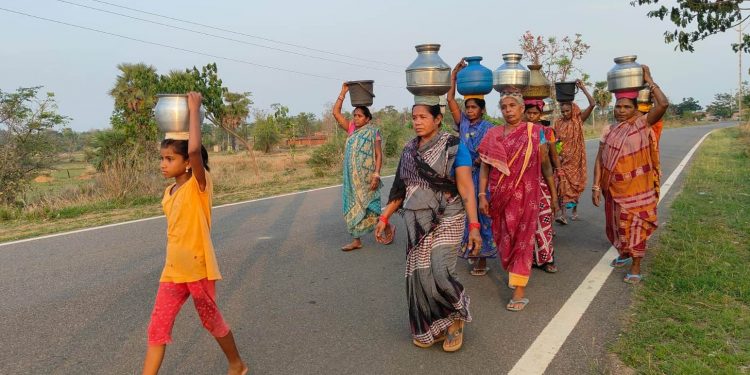Bolangir: Once the Lower Suktel Dam comes up, thousands of acres of farmland in this perennially drought-prone district will be irrigated. The drinking water woes of many towns and villages in the district will be a thing of the past. Economic development will blossom with accelerated growth, and Bolangir will be transformed from a backwards to a developed district. Harping on such development, the government promised to make all kinds of arrangements for the displaced people of 29 villages under the project-affected Loisingha and Bolangir blocks. Pinning their faith in the government, thousands left their homes and ancestral lands.
However, since the day they left their villages, life has become miserable for them. As irony would have it, those who gave up everything they had to alleviate the water woes in the district, are now unable to get even a handful of water in the scorching summer season. The oustees are now living a life of struggle in Lower Suktel Temporary Rehabilitation Colony at Kusmel under Loisingha block. The oustees recall the humble yet easy life they were living in their villages. Residents of Banchhorpali, Gadashankar, Dunguripali, Podhamunda, Koindapali and Bijapati under Loisingha block had never known such scarcity of water with Suktel river flowing nearby. They had their own wells and ponds in their backyard and tube wells in their houses. But today, they are living a miserable life after being displaced. Their new address is Lower Suktel Temporary Rehabilitation Colony in Kusmel about 15km from the district headquarters of Bolangir. For the past nine months, 32 homeless families have been living there in temporary houses with tin roofs.
In the absence of any source of drinking water, they have to walk every morning and evening about one-and a-half kilometres to Phatabahal village to collect water. In the scorching summer now, they have to visit Phatabahal at least six times every day. Women of the houses and some schoolchildren walk the long distance every day to collect water. The tube well in the rehabilitation colony has run dry adding to their woes. Despite repeated demands to supply water through tankers, the administration has remained silent. The displaced have alleged that they have been cheated. Neither the administration nor the politicians lend an ear to listen to their grief. With the mercury rocketing, the temporary tin houses are turning unbearably hot with temperatures beyond 44-45 degrees Celsius making life difficult. People are living under the trees all day instead of staying in temporary houses. The administration assisted up to Rs 5 lakh to the displaced families before they were rendered homeless. They were promised homestead land, pucca houses, and guaranteed employment.
However, it appears, all such hopes of the helpless oustees have fallen victim to the administration’s dementia. The children of the displaced have not seen blackboards for the last nine months. There is no school near the colony. A few days ago, District Collector Gaurav Shivaji Isalwar visited the Lower Suktel Temporary Rehabilitation Colony and promised to solve the basic problems. However, drinking water is yet to reach them. As per sources, rehabilitation colonies in Jhankarpali, Kusmel, Gedabanji and other locations are suffering also from grave drinking water problems.






































